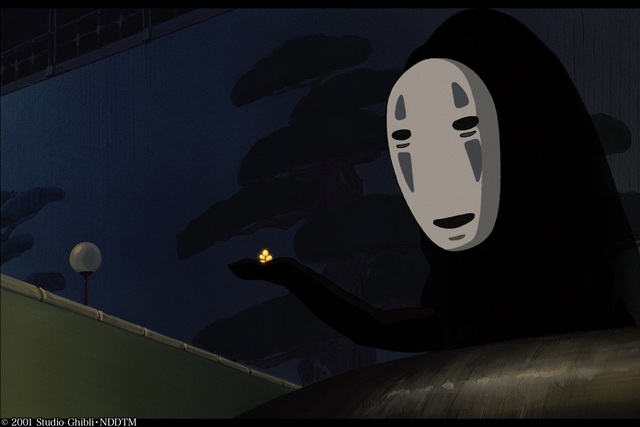The mysterious character No-Face (Kaonashi) from Studio Ghibli’s Spirited Away (2001) has captivated audiences with its haunting presence. With a black, shadowy body and a white mask, No-Face begins as a quiet and seemingly helpless figure, only to gradually grow insatiable—consuming those around it in a surreal display of desire and emptiness. At once eerie and lonely, No-Face invites a wide range of interpretations from viewers.
Among international critics and audiences in particular, many see No-Face as a mirror of modern humanity—a symbol of urban individuals who have lost their identity, adrift in a world of consumption and disconnection. But why does this silent, floating figure without a “face” evoke such deep and universal empathy? Perhaps it is precisely this absence—this emptiness—that allows people from all cultures to project their own reflections and find meaning in the quietest character of all.
A Masked and Invisible Presence
In Spirited Away, No-Face speaks almost no words to anyone except Chihiro. Instead, it offers gold to others as if reflecting their desires—shifting its behavior to match those around it. This shape-shifting quality echoes the struggles of modern individuals who find it difficult to establish a clear sense of identity.
Western critics have noted that No-Face represents the anonymous modern individual, pressured to “be someone” in society. It has been interpreted as a metaphor for the faceless laborer, or even the anonymous user in the digital age.
Without a consistent will of its own, No-Face blends into its environment, adopting roles and reactions according to the expectations placed upon it—much like people navigating global capitalism, constantly performing social roles with a mask-like face.

Runaway Desire and the Devouring Spiral
The scene in Spirited Away where No-Face showers gold across the bathhouse, drawing out people’s greed and eventually growing enormous—swallowing food and workers alike—is far more than a monster spectacle. It conveys a deeper message: when desire loses the boundary between self and others, it spirals into collapse.
Viewers in the United States and France have interpreted this sequence as a metaphor for the unchecked desires of consumer culture. No matter how much it consumes, if the core remains hollow, fulfillment will never come. That haunting emptiness echoes through No-Face’s silence… and its quiet, sorrowful cries.
A Being Whose Form Emerges Through Connection
Yet No-Face is not a villain. Rather, it is a figure lost in loneliness and confusion—searching for acceptance. When Chihiro gently tells him, “I don’t need that,” she rejects his gold and greed, and instead engages him through words. It is through this quiet act of human connection that No-Face begins to return to his true, peaceful self.
This reflects a central theme of the film: our sense of self can only take shape within healthy relationships with others. For today’s audiences, this is a deeply resonant idea. In an era of social media validation, anonymous expression, and virtual identities, No-Face becomes a mirror—making visible the emotional uncertainties of our time.

Global Resonance: “I Was No-Face Too”
On platforms like YouTube and film review sites, viewers from around the world share strikingly personal responses: “I saw myself in No-Face,” or “That loneliness and loss of control felt just like me.” Especially among urban youth, immigrants, and those struggling with identity, No-Face has become a powerful symbol of isolation and quiet desperation.
At a university in the UK, a workshop exploring Spirited Away used theater techniques to “embody No-Face” as a means of deepening self-awareness. Many students resonated with the character’s behavior—mirroring others, adapting based on reactions, and absorbing others’ desires. In those moments, they said, “That’s exactly how I feel.”
Conclusion — The Meaning of Having No Face
By the end of Spirited Away, No-Face finds peace living quietly with Zeniba, Yubaba’s twin sister. In this new space, he is no longer consumed by desire, nor does he mold himself to others’ expectations. He has finally found a gentle, stable sense of belonging.
To have no face means holding the freedom to become anything—while also carrying the anxiety of not being anyone. In this duality, No-Face becomes a mirror for us all: a symbol of the wandering modern soul, searching for identity without a name, quietly reflecting the unease of our times.




